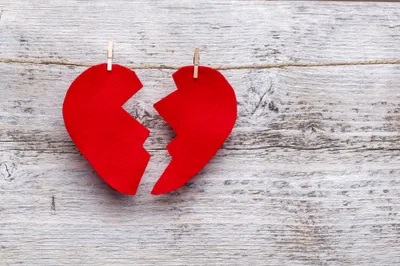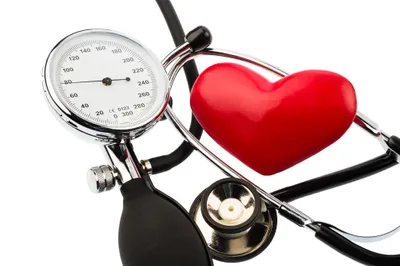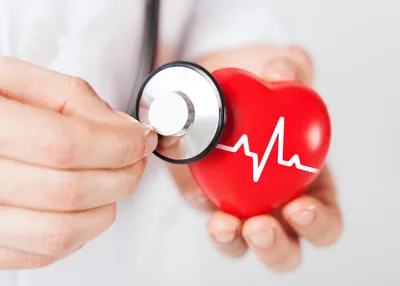Heartbreak comes in many forms and affects people in different ways. Being in love and being loved brings a lot of joy and happiness to your life, and when that love is taken away, it isn’t something most people can easily let go of. Whether you’re pining after a first love or feel broken after a divorce, heartbreak can have a significant impact on your mental and emotional health. But it can also cause physical pain and can even damage the health of your heart.
While heartbreak isn’t considered a true medical condition among most doctors, there are things people experience and react to when they’re heartbroken that can cause real physical problems. These ten reasons why heartbreak can really damage your heart will hopefully motivate you to turn to positive coping strategies and support systems after a breakup…
1. Added Stress
If you’re heartbroken, your stress level is likely to increase. You might experience confusion or demand answers from your ex that only add to the stress. It’s also common during the time after a breakup to take a good, long look at your life and where you’re going, and you may not be happy with what you find. These thoughts add stress, and if you come out of those thoughts with no answers or more sadness and disappointment, your stress is likely to multiply, putting a strain on your heart. It’s no coincidence that people in high-powered, stressful jobs have heart conditions. Stress damages the heart and it isn’t picky about where that stress comes from.
2. Poor Eating Habits
Binge eating may be a stereotypical response when you go through a bad breakup, but it isn’t just a stereotype – it happens to a lot of people. Being stressed out and upset can make you take your problems out on food by eating more and choosing unhealthy foods high in fat, sugar and sodium. You might turn to comfort food or make several trips to the corner store for your favorite candy or chocolate. But eating unhealthy like this can take a toll on your heart. It can increase your risk of hypertension, coronary artery disease, and high cholesterol, among other mild to serious heart complications.
3. Lack of Exercise
To make the breakup and binge eating even worse, people who are heartbroken often can’t gather the energy or motivation to exercise. But exercise is integral in maintaining a healthy lifestyle, including keeping your heart healthy. Cardiovascular workouts have a direct impact on preventing heart disease. And exercise can actually be a good outlet when dealing with heartbreak because of the positive feelings and concurrent rush of endorphins you get from a good workout. So exercising will not only help prevent damage to your heart while you deal with a breakup, but also provide a healthy way to reduce stress and get your emotions under control.
4. Increased Blood Pressure
The emotional stress you feel when you’re heartbroken can directly affect your blood pressure. Feeling emotions strongly – specifically, feeling extremely upset or angry – can raise your blood pressure from the increased adrenaline your body produces. High blood pressure can increase your risk of heart disease and heart attack, damage your arteries, and in some cases, result in an aneurysm. One of the main issues with high blood pressure is that it can build up slowly over time, and you may not know you have it or experience any of the symptoms until it’s severe. So do anything you can to reduce the emotional stress during a heartbreak to keep your blood pressure in check.
5. Depression
When advertisements say depression can physically hurt, it’s the truth. It’s also true that depression can severely impact all aspects of your life, from your career to your relationships with friends and family. The extreme emotions felt by those with depression and the difficulty coping can literally cause physical pain and increase the risk of other illnesses and health problems. And while a lot of people suffer from depression, what you might not know is that depression can put you at risk of developing heart disease. When you experience heartbreak, you could be at risk of becoming depressed, furthering your risk of damage to your heart.
6. False Heart Attacks
The emotional stress and overwhelming thoughts and feelings caused by a breakup can mimic a heart attack. The surge of adrenaline to the heart causes a similar sensation as when you’re having a heart attack, and as a result, the stress and other emotional trauma may be heightened. Many people who experience false heart attacks end up at the emergency room, only to find out that there’s nothing actually wrong with their heart – and the experience can be quite traumatic. The good thing is, these symptoms are usually short-term and don’t typically cause any lasting damage.
7. Increased Alcohol Consumption
Alcohol is often used as a way to numb the pain from heartbreak and it can be tempting to turn to the bottle when you’re stressed out and emotionally unstable. But alcohol is a terrible crutch for heartbreak for several reasons, one of which is that it’s a downer. Drugs and alcohol that are considered downers can end up amplifying your feelings of sadness, depression and anger, making you feel worse at the end of the day. Excessive alcohol also takes a toll on your heart – according to the Mayo Clinic, excessive drinking can result in an enlarged heart, increase your blood pressure, and cause other cardiovascular complications.
8. Panic Attacks
Panic attacks involve intense fear and cause many physical reactions, from heart palpitations and trouble breathing, to sweaty palms and dizziness. Quite simply, they can be terrifying and lead to a number of phobias that can worsen the attacks. Anyone with a panic disorder knows that one of the biggest fears is having a panic attack, and the stress of this often leads to more panic attacks. While they don’t necessarily cause heart damage, a panic attack combined with another illness can damage your heart and put you at risk of a heart attack or other cardiovascular disease. You may even feel like you’re having a heart attack during a panic attack.
9. Restricted Breathing
Hyperventilating or experiencing restricted breathing is common when you’re extremely upset. So many thoughts and intense feelings can race through your body during a breakup, and can eventually lead to trouble breathing if you aren’t able to find a positive coping mechanism. You may not have a clinical panic disorder or experience full blown panic attacks, but you can put stress on all of your muscles, including your heart, if you have prolonged episodes of trouble breathing. Similar to a panic attack, the stress from not knowing when or if you’re going to have another episode can cause other physical and mental problems, making it a vicious cycle.
10. Broken Heart Syndrome
Many health professionals do not believe in broken heart syndrome, but the possibility of heartbreak actually being a form of disease or illness has gained popularity over the years due to some compelling evidence. Many doctors would instead call it stress-induced cardiomyopathy, where the heart is unable to properly pump blood through the body. It’s a temporary condition that’s usually brought on during times of extreme stress, including during a breakup. Anyone under extreme emotional stress – even those who are otherwise healthy – could experience broken heart syndrome. According to the Mayo Clinic, it can cause chest pain and shortness of breath, but any negative effects usually reverse within a week.













